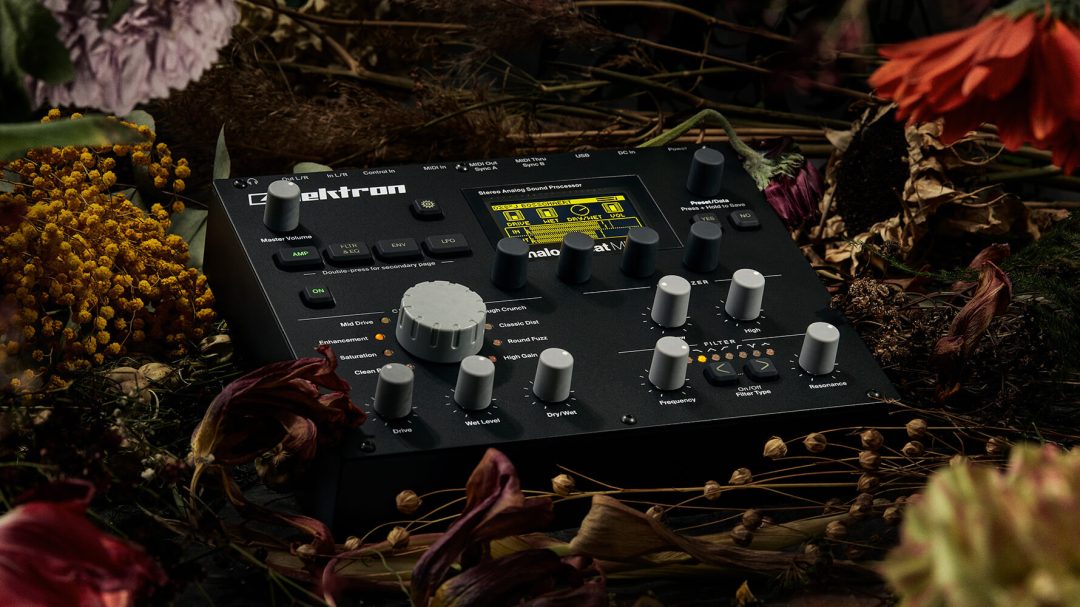Digital recording, with all of its advantages and convenience, is a little too clean for most ears. When we plug a microphone straight into an audio interface with sparkling clear preamps, we’re not getting any of the mythical analog “mojo.” So that’s when we find ourselves reaching for saturation plugins in addition to a multitude of analog emulations of famous hardware, to throw some mud at the wall, so to speak. And speaking of hardware, the Elektron Analog Heat MK2 is a wholly unique product in review — an analog distortion box with DAW integration and much, much more.
Bring the Heat with the Elektron Analog Heat MK2
Saturation and distortion are some of the most sought-after sonic characteristics in all of recording and mixing. Even at its most subtle, there’s something about a little grittiness that’s incredibly pleasing to the ear. Things sound fuller, richer, and more intimate when they’re not clinically sterile.
Digital technology is a marvel and has made seemingly impossible things possible. But there’s a reason why analog gear is a part of the recording, mixing, and mastering processes at every stage, even if it’s just a software replica of an 1176, Pultec, Fairchild, or SSL channel strip.
- RELATED: McDSP FutzBox Review
- RELATED: Overdrive vs. Distortion | What’s the Difference?
The Analog Heat MK2 by the Swedes at Elektron is a desktop module with eight stereo distortion circuits, seven-mode filtering, and two-band EQ. It’s capable of subtle enhancement or full-on blasphemy. While Elektron is firmly rooted in the synthesizer, drum machine, and sampling worlds, to write off the Analog Heat as simply a complementary device to those would be a disservice. You can send any signals you want, including full mixes, through the Heat to bring your projects to life.
What’s New with the MK2?
Internally, the MK1 and MK2 units share the same circuitry. Externally, the MK2 received a new OLED screen with better visibility for dimly lit clubs; new backlighting for essential buttons; and smoother encoders. Thankfully, Elektron is a company that values its customers’ opinions, and they routinely make adjustments to their products in response to user demand. There may not be a night and day difference between the MK1 and MK2 Analog Heat devices, but the minor tweaks increase usability in a big way.
Elektron Heat MK2 Review
Improved Encoders
We mentioned encoders as a new feature in the MK2 version above. It’s true that these encoders are now incredibly sensitive. They’re perfect for making precise adjustments down to the tiniest unit. This is arguably the biggest improvement overall, as the MK1’s felt a little sluggish. Coming from the original unit, the new encoders might feel unwieldy, but once you’re accustomed to them, you’ll never want to go back.
Choose from 8 Distortion Modules
Analog Heat includes eight distortion modes under the heading “Character.” On the left side of the large encoder are the four gentlest saturation types, while the right side carries the scarier ones. Clockwise from left we have Clean Boost, Saturation, Enhancement, Mid Drive, Rough Crunch, Classic Distortion, Round Fuzz, and High Gain.
The left side is ideal for putting on full mixes or buses when you just want some analog sheen. The right side offers more extreme settings to shape individual instruments, for example.
Analog EQ + Filter
Analog Heat features a simple two-band EQ — low and high — to help further sculpt the distortion’s sound. Additionally, there are seven filter types with frequency and resonance control, so you can add specified harmonic richness to a source and refine it with the EQ.
Overbridge Software
Overbridge is probably one of the coolest features this device has. You can integrate Analog Heat into your DAW over a single USB cable. From there, you have a whole software interface from which you can control the hardware. To put it simply, it’s like turning your Analog Heat hardware into a plugin for your DAW.
Elektron Analog Heat vs. Culture Vulture: How Do They Compare?
The Thermionic Culture Vulture is an all-tube classic hardware saturation unit. Beyond both being saturation/distortion boxes, most of the similarities end there. That’s not a knock to either device, as both are incredible in their own ways. They’re just animals altogether, and you’d get more versatility from the Analog Heat for significantly less money.
The Elektron Heat MK2 Offers Improved Stereo Distortion & Processing
The Elektron Analog Heat MK2 is simply a beautiful thing. It truly offers a lot in terms of flexibility, and it’s equally user-friendly which is always a great touch. If you’re on the hunt for a versatile hardware saturator, definitely jot the Analog Heat on the shortlist.
